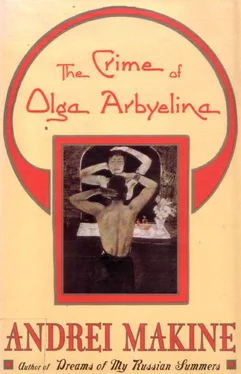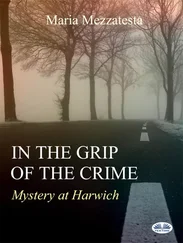Among the adults who speak to her next day she senses a slight hint of embarrassment both in their voices and in their eyes, that sometimes avoid her own, sometimes seem to be questioning her. For the first time in her life she enjoys their weakness. She grasps that their world is much less secure than it appears and that one can play on these insecurities. An unknown voice rings out inside her head: a mocking, aggressive voice that from now on takes it upon itself to seek out the shameful hidden corners of every thought, of every action; to stir the thick sediment of people's hearts… When one of her cousins begins to play a melancholy polonaise in the evening this little voice pipes up: "And what if I told her that yesterday, in a room not ten yards from here, a woman dressed as a bat was writhing like one possessed astride the very man my poor cousin is hopelessly in love with…"
So the world is this exciting, cruel game. A game with inexhaustible permutations, with rules that one can change oneself during the course of play.
Three weeks later another celebration begins, as so often, with fireworks. Li officiates in her magician's cape, delighted with the applause and shouts that accompany each salvo. The merriment reaches its peak when a purple rocket fails to take off properly and propels a violent shower of sparks across the lawn, right up to the roots of the apple trees. Li joins in the general jubilation, her voice drowned in the guests' raucous chorus. It takes them several minutes to realize that her laughter is in fact a terrible sob of pain. The white gash that has ripped open her cheek, from chin to temple, is already filling with blood… That night in the house, heavy with the silence of an aborted celebration, Olga ponders once more the uncertain and changing rules of the game they call life. Li is what the others call "a daughter of poor parents." According to all the storybooks, to common sense, and to the noble sentiments their childhood was reared on, Li deserved a wonderful compensation as a reward for her goodness and her modesty. And there she was atrociously wounded for life… So had they been right to turn the grandmother's portrait upside down? No doubt this wound is a nod and a wink addressed to them by life, by this real, complicated, hidden, provocative, pitiless, mocking life, that delights in thumbing its nose at decent sentiments.
Olga thinks she is getting to the heart of this life's logic: "If I hadn't dropped Li's magic wand in the doorway of the room where the peasant and the bat were embracing, the man wouldn't have sneered at her in front of everyone at the fireworks; he wouldn't have said, 'That magician sticks his nose in where he has no business and listens at doors.' Li wouldn't have heard that hurtful and unfair remark. Her hands would not have trembled. And the rocket would have gone up into the sky… So everything depended on the caprice of that little stick of wood rolling on the floor!"
"Li wouldn't have been disfigured if that counterfeit peasant and the bat hadn't been yoked together by desire…" Four years later in the spring of 1916 she says it again. Like the century, she is sixteen. Meanwhile her uncle has committed suicide, the estate has been sold, the old mansion razed to the ground, the garden destroyed. Where the house once stood all that is left is the rectangle of the foundations, covered in weeds. Little red beetles run along the worm-eaten timbers and across the granite flagstones colored with yellow lichen. And above it all in the springtime void of the sky the eye cannot help seeing again, as in a mirage, the vanished house, the windows that look so alive, the four columns of the facade, the wooden walls, blackened with time. Perplexed, she thinks she can recognize the arrangement of the rooms and the direction of the corridors in this transparent house. This great cube of air contains an unimaginable density of lives from long ago, a long sequence of generations: the chamber where her grandmother's coffin rests for three days; the noise of the parties, and that whole avalanche of words that were ephemeral but could inspire happiness or break hearts; all the nights of love; all the births; even that room, lost in the intersection of galleries and corridors-the one where a man in peasant costume gazes blearily at a woman whose panting gasps keep time with the rhythm of pleasure. And the bed on which a young girl lies, from whose face they will shortly remove the dressings already loosened by her impatient hand…
The sight of this ethereal house crammed with so many existences makes her giddy The walls are already melting into the sky, the windows fading into the blue-she has just time to see the tiny attic room where her grandparents' old servant lived, a cubbyhole that smelled of the resin from burnt wood, lit by a night-light flickering in front of the icon, where, whatever the weather, the narrow window always seemed to be looking out onto a snowy night…
A young man of around twenty, her cousin, whose life used to be protected with the help of pillows tied to the trees, is already calling to her from the carriage, straightening up on his saddle, holding the reins. They are going back to St. Petersburg.
This cousin is one of the last remaining ghosts from those parties of long ago. Olga bumps into him occasionally at poetry evenings, in the restaurants where the artistic bohemia of the capital gather. In his poems he talks of the "the curse of princes" that affects him and gnaws at him. Only a small circle of initiates knows it is a reference to hemophilia. Those not in the know find his verses ridiculously overinflated and lachrymose. A different kind of verse is in fashion; Olga often declaims it like a stimulant before nights filled with rhythmic words, wine, sensuality, and cocaine:
Pineapples in champagne! Pineapples in champagne! An unwonted savor, with sparkle and sting. I have donned a disguise: a Norwegian in Spain! For my pen is drunk and my heart's on the wing!
Indeed, she often has the impression that the costume balls have not come to an end at all and that currently the whole of Russia has succumbed to this craze for dressing up. You no longer know who is who. The great wind of liberty intoxicates them. You can kill a minister and find yourself acquitted. You can insult a policeman, spit in his face, and he will not stir. Apparently that poet rising to his feet at the back of the hall, a champagne flute in his hand, is a well-known revolutionary. And the man over there with his arm around the waist of a woman whose breasts are almost bare is a police informer. The singer just making a sign to the pianist is a conspirator in the plot against the Tsarina's monstrous favorite. And this very young woman here, with a strangely pale face, her eyes ringed with black, is the daughter of one of the most celebrated families in Russia. She has broken with her background, she is the muse of several poets, but has given herself to none of them on account of a mystical vow…
Olga looks at herself in the long mirror that reflects both the room in the restaurant and the pale face with black rings around the eyes-her own…
The ball goes on. The Tsarina's favorite is killed. The Tsar is overthrown. Assisted by his children, he cuts wood. At last the country seems to be responding to the dreams formulated in the old days at her uncle's house. Its onward march accelerates: outmoded traditions are smashed to smithereens, the head of the new government has to wear his arm in a sling after shaking hands with tens of thousands of enthusiastic fellow citizens. But soon the country's breathing becomes spasmodic: menacing groans can be heard…
She joins in the ball with all the impatience of youth. She samples everything: decadence, futurism, workingmen's Sunday schools; she studies to be original in a world that is no longer surprised at anything. All around her debauchery is humdrum, insipid. One of the poets, before possessing his mistress, attaches bear's claws to his fingers. This will soon seem banal… She explains to the men in love with her that she will only give herself to the one who will kill her and take her dead. This is more surprising than the bear's claws, because of her youth, perhaps, or her livid face with a look that is meant to be hellish; or else because of the seriousness with which she utters these idiocies… Secretly she still thinks about that young horseman five years ago-galloping in the night through the white foam of the apple trees. She forbids herself to hope, but hopes all the same that her first love will have this freshness of snow. And the mocking and aggressive little voice lurking inside her never tires of sneering at this last island of sensibility in her heart…
Читать дальше












